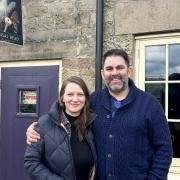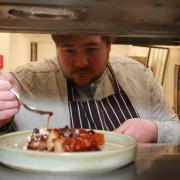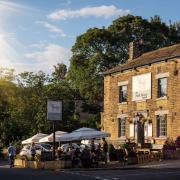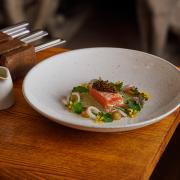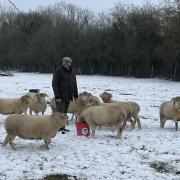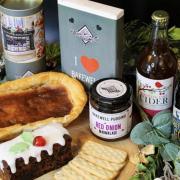Matthew Corrigan relates the fascinating story behind a world-famous county firm – Swizzels-Matlow of New Mills – which is celebrating its 80th year in the town.

Over time the sights and sounds of a community often come to define it, giving a place an identity that sets it apart from all others. For the people of New Mills there is one more characteristic that serves to identify their town: the wonderfully sweet aroma that perfumes the air. For as long as anyone can remember, the tantalising smells emanating from the Swizzels-Matlow factory have been a part of life in New Mills. Nestling alongside the picturesque Peak Forest Canal, it is an ever-present reminder of a manufacturing success story that is known and loved around the world.
In fact, 2020 marks 80 years since the company first made New Mills its home, a decision born of necessity as the London Blitz started to take effect.
Their story began in 1928 when Russian émigrés Alf and Maurice Matlow formed Matlow Bros Ltd to make their signature jelly sweets. Five years later the brothers went into business with a rival, David Dee, sharing premises in Canning Town, East London. According to the story, Alf's wife enjoyed the Swizzle drink and very much liked the name. Switching the last two letters in the word around gave them the name for their new venture: Swizzels Ltd was born.
The company went from strength to strength throughout the thirties, launching a range of innovative new products.

Rainbow Drops, made from sugar-coated puffed rice, were a particular favourite. Production was initially rather haphazard as ingredients were fired from a large gun under 250psi pressure. Eventually, moisture meters were used in the process until extrusion technology took over in the 1970s. Still incredibly popular, the company now produces as many as 14 million bags per annum - enough to fill 25 Olympic-sized swimming pools.
Betta Bars were another big seller. Originally known as Butternut, these caramel-coated cereal bars were very much ahead of their time. For many years they were mixed by hand but mechanisation eventually became unavoidable. New machines were specially designed with paddles that mimicked the movements of Ruth Ford, one of their best packers.
Despite its successes, the company was not immune from what was going on in the wider world and as the decade drew to a close the horrors of the Second World War were starting to be felt. Hitler's Blitzkrieg began in earnest in September 1940 and heavily industrialised East London was right in the firing line. Night after night, the streets of the capital shook as waves of Luftwaffe bombers pressed home their attack. Located where they were it was very much a matter of when, not if, the factory would be hit and against this backdrop the decision was made to move production elsewhere. In much the same way as thousands of city-dwelling children were evacuated at the time, the machinery was transported to a farm in the countryside as a temporary measure. It was, however, soon clear that the situation was unworkable, and a countrywide search for new premises began.
It was Colin Tranfield, Northern Sales Representative for the company, who found the abandoned canalside mill in what was then an economically deprived town tucked away in the hills of Derbyshire's High Peak. Heading north, Alf Matlow based himself in the Ram's Head in Disley and opened negotiations.

For the local council, the arrival of the sweet makers must have been something of a godsend. Determined not to miss out on a much-needed injection of wartime capital, New Mills Urban Council (as it was then) agreed to help refurbish the derelict premises. For their part, Swizzels would provide much-needed jobs for the townspeople. Production was quickly underway, the factory going into operation while the council's workers were still repairing windows. In late 1940 the new factory opened officially. Good news had been thin on the ground, and the Manchester Evening News sent reporters to cover the story.
Then, as now, the requirement for sugar was immense. However, these being the war years sugar was strictly rationed. Never ones to shy away from a problem, the Matlow and Dee families acquired several smaller sweet-making businesses in order to increase their supply. Reasoning that a healthy workforce would be good for both staff morale and production, chickens and a goat were kept on the premises. The animals provided a steady supply of eggs and milk for the workers, a far-sighted practice echoing that of one of the area's earlier mill-owning entrepreneurs, cotton magnate Samuel Oldknow. It was the first sign that the new factory owners were showing a commitment to the local community. It would not be the last.
Throughout the war the company continued to make the confectionery for which it was becoming famous. Interestingly, it also played its part in the war effort: part of the factory diversified into producing water purification tablets for the Ministry of Defence. In 1946, with the country emerging from the long, hard years of war, Swizzels embarked on a programme of expansion. One hundred girls between the ages of 15 and 18 were taken on to meet the demands of a resurgent export market. A new product, Parma Violets, was launched. Initially designed as a breath freshener for smokers, the purple tablets first went on sale in pubs before gaining popularity as a children's favourite.
Then, in 1954, the sweets that would go on to become iconic were debuted. During a late night meeting at the home of Solly Weller, owner of wholesaler Northern Confectionery, the idea to print messages on sweets was hatched and Love Hearts appeared on the scene.

Using a still-secret method, as many as 7,300 different romantic phrases have appeared on Love Hearts over the years. They have been specially made for events as diverse as Prince William's 21st and the wedding of Wayne and Coleen Rooney. Today, the Love Heart remains a firm favourite with annual production of 2.7 billion individual tablets. In 1971 the mill was extended to cope with booming demand with the new section opened by the Lord-Lieutenant of Derbyshire, Sir Ian Peter Andrew Munro Walker-Okeover.
Until this point production had been divided. Swizzels Ltd made their compressed sweets, and chews with boiled sweets had fallen under the remit of the still-trading Matlow Bros Ltd. In 1975 the two companies merged to become Swizzels-Matlow and the same year saw them win a Queen's Award for Export Achievement.
Swizzels-Matlow is the largest employer in the area and proudly retains its close links with the community. As well as providing sponsorship for New Mills Juniors Football Club, the company is involved with mentoring business students at local schools. A motivated and committed workforce has long been a key factor in the company's success. Over 30 per cent of the employees have been with the company for more than 15 years. Twenty-one have served more than 40 years and four current staff members (excluding the directors) have chosen to remain beyond the age of 70.
Swizzels-Matlow is still run by three members of the founding families - Jeremy Dee, Nici Matlow and Jonathan Dee - and has annual sales approaching £100 million across 25 export markets. Today's product range is keeping up-to-date with changing times, including vegetarian, vegan and gluten-free items, and you can even order personalised sweet hampers from an online shop. Certainly, 80 years after the war necessitated its arrival, Swizzels-Matlow has become a symbol of New Mills itself, helping to put the town firmly on the map.

For more information visit www.swizzels.com






